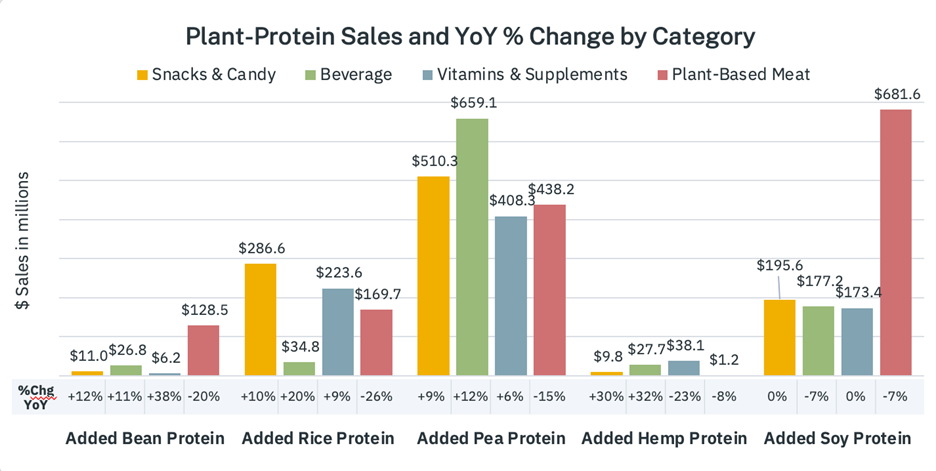Key Takeaways:
- Plant-based proteins offer diverse nutritional profiles based on shopper health needs
- They are significantly more sustainable than today’s animal-based alternatives
- Depending on the protein, the Snacks & Candy, Beverage, and Vitamins & Minerals categories all represent major growth opportunities
Introduction
Continued innovation in the types and applications of plant-based proteins have made them valuable alternatives to traditional animal-based varieties. As shopper values continue to drive marketplace evolution, plant-based proteins maintain their steady growth trajectory thanks to their robust nutrient profiles and diverse applications.
To understand how plant-based proteins are impacting your category, check out these attributes from SPINS Product Intelligence:
- Ingredient – Added Bean Protein
- Ingredient – Added Hemp Protein
- Ingredient – Added Pea Protein
- Ingredient – Added Rice Protein
- Ingredient – Added Soy Protein
What Are Plant-Based Proteins?
It’s not just soy! While soy protein certainly was the tip of the spear in establishing and driving the plant-based protein movement, there are many varieties of plant-based proteins in the market today.
Similar to super mushrooms, there are a wide variety of plant-based protein sources that are rapidly gaining traction, each with different health benefits:
- Soy:
- Complete protein—contains all essential amino acids to support growth and development
- Naturally low in fat and free from cholesterol and “bad fats” like saturated fat
- Rice:
- Gluten- and dairy-free source of protein
- Considered hypoallergenic due to rare involvement in food allergies
- Used not only in Food & Beverage, such as in Beauty and Cosmetics
- Pea:
- Has all essential amino acids, but is low in methionine making it just short of a complete protein
- Rich source of non-heme iron
- Provides structure in gluten-free foods while improving texture in other meat alternatives
- Bean:
- Nutritional profile varies by bean, but tend to be high in minerals and B vitamins such as potassium, iron, magnesium, folate, niacin, thiamin, riboflavin, and vitamin B6
- High protein and low fat
- Hemp:
- Rich in antioxidants, such as vitamin E, as well as fiber and heart-healthy omega-3 and omega-6 unsaturated fatty acids
- Does not require extensive processing, can just grind hemp seeds
- Highly sustainable crop—requires less water or pesticides to maintain compared to other protein sources
Why Plant-Based Proteins Matter
As can be seen above, plant-based proteins are an organic response to consumer demand for more sustainable, yet nutritious alternatives to traditional animal-based proteins.
Plant proteins have a wide variety of nutrient profiles that satisfy a diverse array of health needs, and, as a category, have shown potential benefits to cardiovascular health compared to animal-protein diets.
Moreover, they are highly sustainable compared to animal proteins due to lower carbon, water, and energy requirements for a similar nutritional yield.
Finally, the wide variety of plant-based proteins available in the market supports diverse uses. These range from addressing food sensitivities, adding structure in gluten-free foods, and even finding use outside of food and beverage, such as in beauty and cosmetics!
How Protein Choice Impacts the Bottom Line
Every ingredient matters. The type of protein leveraged in a product can impact everything from perceived nutrition, the taste profile, sustainability impact, and the number of eligible shoppers due to food sensitivities.

Plant Based Protein Trends: SPINS Natural Channel, 52 Weeks Ending 8/13/23
Based on the data, plant-based proteins continue to be a growing trend in the Snacks & Candy and Beverage categories likely due to adding nutritional benefits without triggering any food sensitivities.
In particular, we’re seeing bean, rice, and hemp rapidly gain traction, while pea-protein, already an established player in those categories, continues with stable growth.
On the other hand, it appears that soy, which paved the path for plant-based protein, is no longer king. Its growth has largely stabilized or declined across the categories above, and while it has the largest market share in plant-based meats, growth in plant-based meats as a category has also slowed.
Conclusion
Plant-based proteins have come a long way in the last decade. As values-oriented shoppers continue to drive marketplace evolution by choosing more sustainable or animal-friendly options, it’s natural that they would look for a variety of options to meet their nutritional and health needs. Ones that aren’t just soy, and in aisles that aren’t just focused on meat alternatives.
Today, plant-based proteins have shown significant growth in several aisles, and we expect this trend to continue as the plant-based trend proliferates across entire stores.







